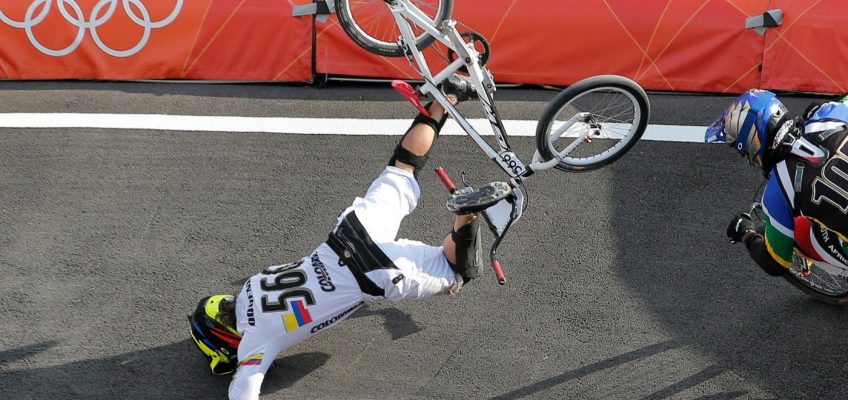By NOREEN NASIR, Associated Press
Logan Edra knows her journey to securing a spot as one of the breakers on the U.S. team heading to the Olympics took longer than some expected.
The 21-year-old Filipina American didn’t officially qualify for the Paris Games until last month. It was the last competition for her to earn an Olympic spot despite being of one of the world’s best breakers — more commonly referred to as breakdancers.
“As much as we have people around us that are encouraging or part of the hype, it’s still a lonely journey. No one really knows what you’re going through except for you,” said Edra, who is ranked No. 14 in the world and had a meteoric rise on the global breaking scene since 2018.
She was expected to defend her championship at the 2022 Red Bull BC One World Final in New York, but was beat out in the intense final round by India Dewi (b-girl India) from the Netherlands before dominating in the Olympic Qualifier Series in Budapest in June.
With all the anticipation around breaking officially debuting as an Olympic sport, Edra and her U.S. teammates are navigating the pressure that comes with performing a uniquely American artform while facing tough competition from what has now become a global phenomenon.
Nonetheless, Edra, known as b-girl Logistx, using the term for female breakers and the nickname her father gave her as a child, is focused on staying grounded and embracing the challenges as she prepares for the global stage.
“I value this goal,” she said, “but not because of what it comes with. More so because of how I’ve grown through it.”
FILE – United States’ Logistx battles Japan’s Riko for a third placing match of the Breaking B-Girls Finals for the 2024 Olympic Qualifier Series held in Shanghai, Sunday, May 19, 2024. Her hope as she heads to Paris is that she doesn’t lose her passion and purpose amid the pressures of performing on a global stage. (AP Photo/Ng Han Guan, File)
An American art up against tough global competition
The breakers from Team USA have the added responsibility of representing the country where breaking, and the broader culture of hip-hop, originated. Hip-hop was born in the Bronx in the 1970s and with it came the rise of breaking, one of the four foundational elements of the movement. The other elements are DJing, MCing or rapping and graffiti “writing.”
“I’m really excited to represent a whole country, but I’m more excited to represent my dance, my artform and I’m super excited to bring the hip-hop culture to the Olympics,” said Victor Montalvo, or b-boy Victor, one of the U.S. breakers. “We’re going to bring something new to the table. We’re going to bring a vibe, we’re going to bring that peace, love, unity and having fun.”
In the U.S., breaking is often considered to have “died out in the 80s,” Edra said. But globally, the culture is thriving.
Some of the world’s best breakers — and top Olympic contenders — are from countries around the world. The who’s who of the best hail from Canada (Philip Kim, or “b-boy Phil Wizard”) to Japan (Shigeyuki Nakarai, or “b-boy Shigekix”) to France (Danis Civil, or “b-boy Dany”) to China (Qingyi Liu, or “b-girl 671”) to Lithuania (Dominika Banevič, or “b-girl Nicka”), among others.
Edra and Montalvo, along with fellow U.S. breakers, Sunny Choi (b-girl Sunny) and Jeffrey Louis (b-boy Jeffro), are not just focused on nailing their moves, they’re serving as ambassadors of the birthplace of a culture and lifestyle now deemed an Olympic sport.
The Paris Games could be their only shot at an Olympic medal — breaking won’t be one of the sports at the Los Angeles Games in 2028.
Preserving the roots of the dance
Montalvo learned breaking from his father and uncle, twin brothers who were breaking pioneers in Mexico. Currently ranked No. 5 in the world, he cites their instruction as learning “from the roots, from the originals.”
“It’s fascinating and gratifying to see something we did for fun and now see it become an international sport,” said Douglas “Dancin’ Doug” Colón, a b-boy of the first generation of breakers from Harlem. He was 15 when he started breaking at parties in the recreation room of an apartment building in the Bronx.
“For us, it was a release, growing up as poor kids in New York City. We had a lot of fire in our energy, that’s why it was so raw,” he said.
Related Articles
2024 Olympics: What to know — and who to watch — during the wrestling competition in Paris
2024 Olympics: What to know — and who to watch — during the weightlifting competition in Paris
2024 Olympics: What to know — and who to watch — during the water polo competition in Paris
2024 Olympics: What to know — and who to watch — during the volleyball competition in Paris
2024 Olympics: What to know — and who to watch — during the triathlon competition in Paris
Hip-hop celebrated its 50th anniversary last summer. Since its founding, the culture has expanded to a multibillion dollar global industry. The expansion and growing popularity of the sport has led to skepticism of attempts to co-opt the culture and commercialize it while imposing a rigid competitive structure and moving further away from the spirit of breaking that has historically been rooted in local communities.
Before there were global competitions and large stages, there was only the cypher – a circle formed by breakers in which b-boys and b-girls enter, one after another, to dance and battle. Unlike organized sporting events, there are fewer rules and restrictions.
Colón isn’t worried about the changes.
“There are still cyphers. There will always be cyphers,” he said. “Everything evolves. Brothers will say: ‘we used to dance. They don’t dance anymore, they go straight to the breaking part.’ But that’s what it is now. They kept evolving and now it’s more acrobatic, more competitive. It’s like the difference between a Model T and a Lamborghini. It keeps evolving.”
A win for visibility
Judges at the Olympics will score breakers based on the Trivium judging system, which scores breakers on creativity, personality, technique, variety, performativity and musicality. The scores can fluctuate throughout the battle, based on how breakers respond to their opponents.
In all, 32 breakers – 16 women and 16 men – will compete over two days, August 9 and 10, at the iconic Place de la Concorde, a public square in Paris that is being transformed into an open-air stadium for the Olympics. The outdoor venue is meant to be a nod to the culture of street battles in breaking.
For Team USA, the hope is that the spotlight at the Paris Games brings more respect and resources to breaking back home.
“From us being in the Olympics, it’s going to grow,” said Montalvo. “There’s going to be a new generation of kids that are going to want to do it… and you just need a dance floor and your body and self expression.”




